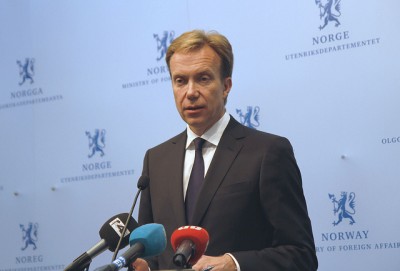Foreign Minister Børge Brende called Russia’s decision to ban imports of Norwegian salmon and other seafood “completely unreasonable.” The bans are included in a long list of other food that Russia is boycotting from the EU, the US, Canada, Australia and Norway.

Brende said the Norwegian government was taking the looming halt of seafood exports from Norway “very seriously” but agreed with other industry spokesmen and analysts that it was “too early” to determine exactly what the consequences will be for Norway’s huge fishing industy, which ranks second only to oil.
“We’re going through these measures together with the EU and other affected nations, and we will together evaluate how we can best deal with this,” Brende said in a statement issued by the foreign ministry on Thursday afternoon, after Russian Prime Minister Dmitry Medvedev announced the import bans Thursday morning. The bans are due to take effect immediately.
Brende, from the Conservative Party, noted that despite strong international pressure, not least after a Malaysian civilian passenger jet was shot down over eastern Ukraine, Russia still has not contributed towards disarming pro-Russian separatists. The EU thus voted to impose stronger economic sanctions against Russia in reaction to the country’s ongoing illegal annexation of Crimea and destabilization of Ukraine.
“Instead of contributing towards easing the conflict in eastern Ukraine, Russia continues to maintain and strengthen it,” Brende said, claiming that “considerable amounts of weapons” were moving over the border from Russia to Ukraine. “It is critical that Russia be met with a wide-reaching and clear reaction from the international community.”
Norway likely to go along with sanctions
Russia included Norway in its bans of fish, meat, fruit, vegetables and dairy products from the EU and the US, even though Norway has not officially imposed the sanctions itself. Brende, due to present them in Parliament after the summer holidays, confirmed on Thursday, however, that “out of consideration to heavy foreign- and security policy,” it was likely that Norway would “stand together with our (EU) allies and partners” and impose the sanctions as well. Russia seems to have expected that, hence the decision to punish Norway in advance.
Fisheries Minister Elisabeth Aspaker, also from the Conservatives, said on Thursday that she was in “tight dialogue” with major players in the seafood industry and that it was “especially important” to chart the consequences that Russia’s bans will have. Some major salmon exporters say they face hundreds of millions of kroner in lost revenues, which could lead to a huge loss of jobs.
“The picture isn’t yet clear, but all indications are that Norwegian seafood exports will be hit hard,” Are Kvistad of the industry association Fiskeri- og havbruksnæringens landsforening (FHL). Russia’s boycott will hit 25 salmon farms and around 10 firms that sell other types of fish to Russia, all of which have been approved by Russian veterinary authorities.
Can replace Russian market
Norway has been hit by Russian import bans before, though, and it led to the EU and US further opening up their own markets to buy more Norwegian seafood than ever. It will probably be possible to export more to Norway’s allies, Kvistad said. Demand for Norwegian salmon is high, “and we hope we can replace the exports to Russia,” he said.
There was more an air of surprise and disappointment than anger among the Norwegians on Thursday, over Russia’s swift decision to retaliate against sanctions instead of trying to ease the Ukrainian conflict that it played a major role in creating. Norway has long viewed Russia as an important neighbour, and had looked forward to building on the increased cooperation between the two countries that has flourished since the end of the Cold War. Instead, relations now are chillier than they’ve been for two decades.
newsinenglish.no/Nina Berglund

